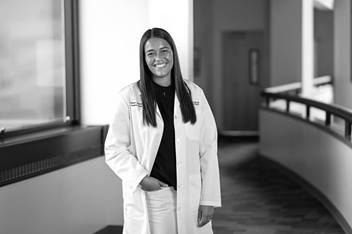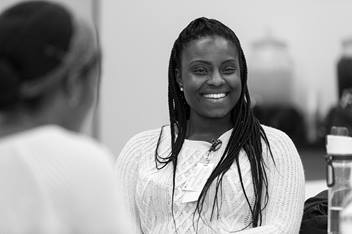Developmental Behavioral Pediatrics Fellowship Clinical Experiences
The primary goal of the clinical component of fellowship training is for fellows to develop competence in the diagnosis and management of developmental and behavioral conditions and in the provision of evidence-based interventions for individuals with these conditions. Developmental behavioral pediatricians must be competent in evaluating patients both independently and as a member of an interdisciplinary team.
Fellows participate in approximately two continuity clinic sessions within the Developmental Behavioral Pediatrics Clinic per week. Fellows learn to evaluate patients both as the sole provider and as part of an interdisciplinary team. Fellows are the primary DBP provider for their continuity clinic patients and continue to see these patients throughout their training. New patient appointments are two hours in length to allow time for administration of developmental assessments. Fellows learn to administer and interpret standardized developmental assessments and to interpret behavioral rating scales and utilize standardized instruments in most new patient evaluations.
Standardized Assessment Tools
- Cognitive Adaptive Test/Clinical Linguistic Auditory Milestone Scale (CAT/CLAMS)
- Peabody Picture Vocabulary Test (PPVT)
- Expressive Vocabulary Test (EVT)
- Beery-Buktenica Developmental Test of Visual Motor Integration (VMI)
- Kaufman Brief Intelligence Test (K-BIT)
- Wide Range Achievement Test (WRAT)
- Bracken School Readiness Assessment
- Autism Diagnostic Observation Schedule (ADOS)
- Childhood Autism Rating Scale (CARS)
- Vineland Adaptive Behavior Scales
- Developmental Profile (DP-3)
- Receptive-Expressive Emergent Language test (REEL)
- Vanderbilt Assessment Scale
- Child Behavior Checklist/Teacher Report Form (CBCL/TRF)
- Conners 3 Rating Scale
- Conners Early Childhood
- Autism Symptom Rating Scale (ASRS)
- Screen for Child Anxiety Related Disorders (SCARED)
- PHQ-9
- Screening Tool for Assessment of Autism in Toddlers and Young Children (STAT)
- Autism Detection in Early Childhood (ADEC)
The Interdisciplinary Training Clinic is incorporated into continuity clinic. For each fellow, one of the new patient evaluation sessions per month is an interdisciplinary evaluation with a psychology post-doctorate fellow in the Intellectual and Developmental Disabilities Program. This clinic is co-precepted by DBP and psychology faculty. The focus is on development of skills for participating in and leading an interdisciplinary team. In addition to clinical evaluation, this clinic includes didactic time which allows for interdisciplinary cross-training and development of teaching skills. DBP fellows educate psychology trainees regarding medical factors affecting development and behavior and medical interventions. Psychology trainees educate DBP fellows regarding administration and interpretation of psychological assessment and behavioral interventions. The patients evaluated in this clinic are typically ages three to six years old, presenting with concerns for developmental disorders other than autism.
This is an interdisciplinary diagnostic clinic focused on autism evaluations for children <48 months referred through the NICU Follow-up Program. Fellows lead the interview, team discussion and feedback and participate in scoring the ADOS and CARS. Other disciplines on the team include psychology, speech and a psychometrician. Fellows see patients evaluated in NIDAs for ongoing care in their continuity clinic. Fellows participate in this clinic monthly throughout their three-year fellowship except for the semester in year two when they are in the Nisonger School-age Autism and Developmental Disabilities Clinic.
This is a monthly clinic focused on new patient evaluations for CP by developmental pediatrics, physical therapy and social work. DBP fellows participate in this clinic approximately 18-24 months out of their three years of training. Fellows also spend time in the CP Team Clinic which provides comprehensive interdisciplinary ongoing care for patients with CP during their motor disabilities block.



